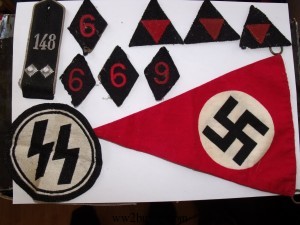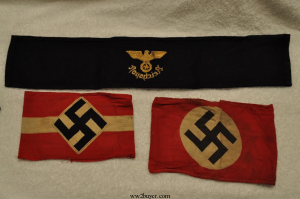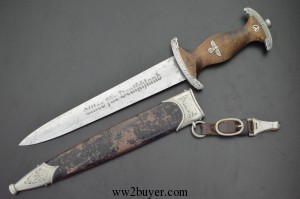Red Cross Dagger
by admin | Aug 8, 2012 | "Mehr sein als scheinen", alles fur deutschland, Arundel Militaria Specialists, Best buyers of WW2, Daggers, Deactivated Guns U.K.Only, Dealers Selling Military Antiques in New Hampshire?, Feldherrnhalle, Forestry Cutlass, Free valuations of Militaria, German Helmet, P D Luneschloss., Uncategorized


£43,000/$65,000
PAID FOR THE ABOVE
Feldherrnhalle Dagger

If you require an offer/free valuation without obligation to sell then we are at your service.

Welcome To German Dagger Buyers.com
We aim to provide one of the very few ethical outlets
for Nazi Memorabilia on the internet.

We do not sell on line.
We supply legitimate museum collections.
We dispise anti semitism.

We only require genuine WW1 and WW2 relics
collected and bought home by U.S. and
commonwealth Service personel.
We are never knowingly outbid on items we require.

Send us in an e-mail containing photos of your Red Cross or Social welfare Dagger and we will provide you with up to date Offer/valuation.

We know what Museums, collectors and our city investors are willing to pay .

We buy from Veteran’s families, collectors and dealers worldwide including the major advertisers on the internet today .

We are high end retailers buying for a long term investment group and for some of the the most advanced collectors.

Whether selling one Dagger or an entire collection GDB.com. would like the opportunity to make you a superior offer.
GDB.com do not support the unregulated sale of Swords or knives on the World Wide Web.

Valuation of Forestry, Hunting, Shooting Cutlasses
We will only supply legitimate none political investors.

Our Payment Policy is straightforward:Sellers receive immediate payment for your items in full. We pay any duty on goods arriving from outside Overseas and pay all postal costs.
By dealing with dedicated professionals you will avoid the risks associated with posting your personal details over the internet we operate a zero spam policy.
If you would prefer to speak to us directly rather than to communicate via email we are quite happy to negotiate by telephone.

Our office is open 11am-5pm GMT every day. If you live within range please come and visit us.
Our services are confidential.
We are happy to make purchases regardless of distance.

We offer a legal selling option for those of you living within areas of the
Union where the open trading in some artifacts is forbidden.
Reluctantly we have suspended the importation of curved blades in line with new. legislation.

David Mattey is online to answer your inquiries.
The Red Cross Hewer became official for daily wear at the beginning of 1938.
The 40 cm long saw backed dagger was worn on all occasions by Red Cross NCO’s and subordinates up to the rank of Haupthelfer. These “Hewers”were exclusively produced by concerns of Robert P D Luneschloss.and Robert Klaas Whilst they bear no visible trade mark the tangs carry the Kissing Cranes logo and PDL beneath the grip plates.
In the early years of the 3rd Reich, the German Branch of the Red Cross, was the main social welfare organisation during a period of recession.

In December 1939, Hitler conferred a new legal status on the Red Cross by recognising it as a national organisation with some independence from Geneva. With this new status, the German Red Cross expanded its size and remit within Germany. It expanded its organisation into two distinct branches:
nursing and first aid.
Providing care for children, the old and the homeless.
During WW2, the Red Cross became involved in
both the home front and the International scene,
tracing and monitoring prisoners of war.
Although the members, both male and female, were on a non-salaried basis, a full-time cadre of uniformed salaried leaders supervised them. The DRK incorporated the omnipresent eagle and swastika with the International Red Cross symbol in the design of their own distinctive insignia.
The DRK Prasident was Dr Ernst Robert Grawitz who also held office in the SS as Obergruppenfuhrer.
His duties also involved acting as Chief Police and SS medical officer.
Dagger Information – Red Cross Hewer
The DRK Hewer was authorised for daily wear in February 1938.
It was 40 cm long and authorised for daily wear by Red Cross NCO’s and subordinates ranking from Helfer to Haupthelfer. The Hewer was mainly manufactured by Robert Klaas and P D Luneschloss.
The Pommel had a flattened top and the cross guard had an oval space into which a Red Cross insignia was fixed. The insignia was an eagle with a swastika on its breast and spread wings. At the eagle’s feet was the International symbol of the Red Cross, a cross with equal extensions based upon points of the compass. The hilts are made of a cheep white metal base with a thin nickel plating of about 2 microns.
The grips were made from two pieces of black Bakelite secured with 2 screws.
The blade was wide with a saw tooth edge on one side that was used for removing plaster casts and preparing splints. The tip of the blade was squared off to conform to the Geneva Convention of medical staff not carrying offensive weapons.
The scabbard was black, enamelled and fitted with nickel platted chape and locket. The Hewer was carried in a leather frog and secured by a clip on the scabbard.
A silver coloured Portapee with blue threads on the crown, tied onto the black leather frog via the fabric strap, completed the accoutrements.
The Hewer was issued from the stores when required, no personnel purchases were allowed.
The Hewer was discontinued in 1940.
The Pommel had a flattened oval top and the cross guard has a langet bearing the Red Cross insignia . The insignia was an eagle with a swastika on its breast and spread wings. At the eagle’s feet was the International symbol of the Red Cross, a cross with equal extensions based upon points of the compass. The hilts are made of nickel plated pot metal.
The grip plate are of black Bakelite one checkered the rear example smooth.
these are secured with 2 nuts andbolts
The blade was wide with a saw tooth edge on one side that was used for removing plaster casts and preparing splints. The tip of the blade was squared off to conform to the Geneva Convention of medical staff not carrying offensive weapons.
The scabbard was black, enamelled and fitted with nickel platted chape and locket. The Hewer was carried in a leather frog and secured by a clip on the scabbard.
A silver coloured Portapee with blue threads on the crown, tied onto the black leather frog via the fabric strap, completed the accoutrements.
The Hewer was issued from the stores when required, no personnel purchases were allowed.
The Hewer was discontinued in 1940.
















